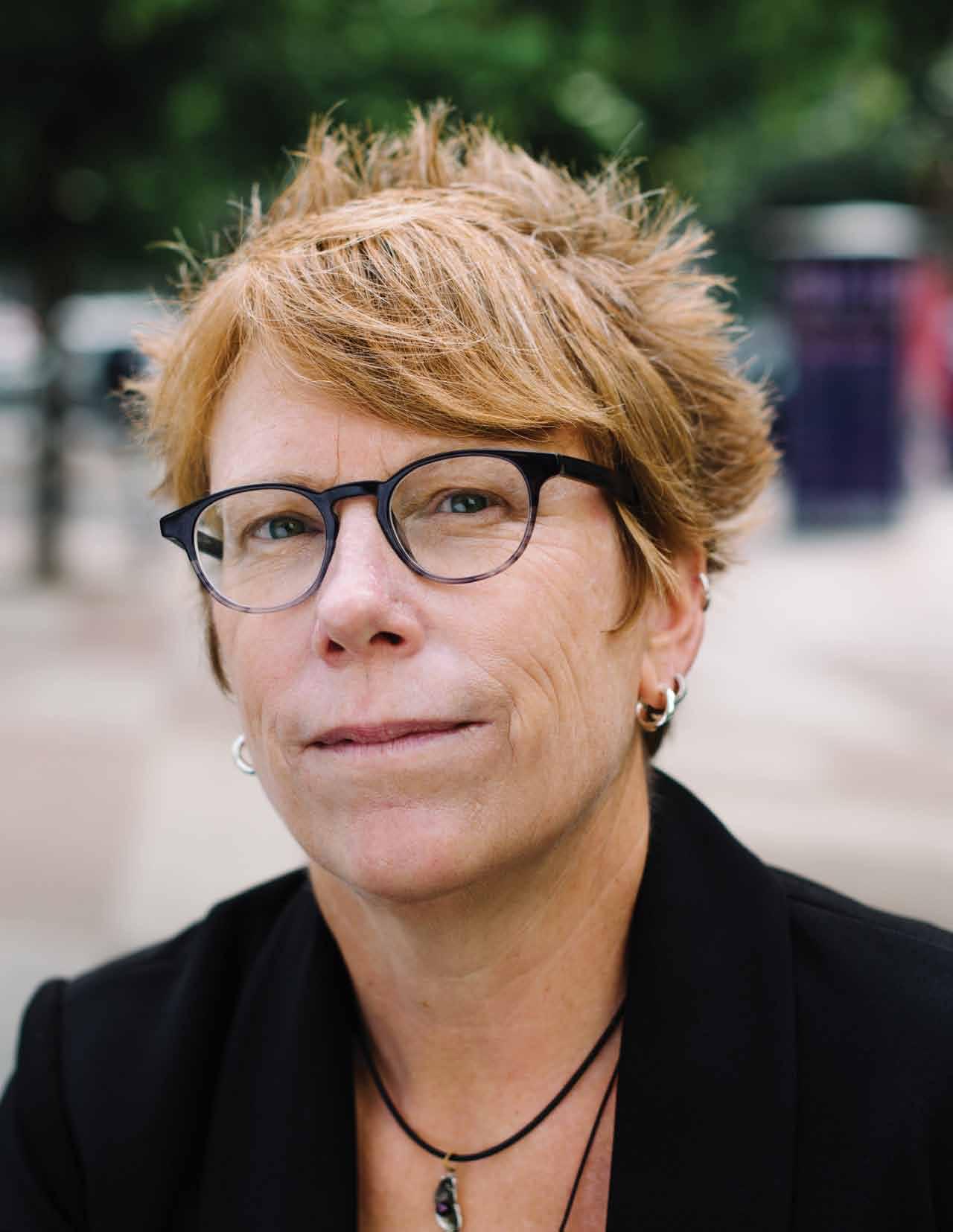
8 minute read
Power Play: Stepping in to lead and represent the OPC team
By Peggy Sweeney
Photography by Stef + Ethan
Advertisement
Nancy Brady was born in Ottawa and grew up in Gatineau, Quebec. “My parents placed a very high value on education. My dad had to quit school when he was 13 to help support his family but went back later to get his diploma and college degree. My mom was always my greatest supporter and the most influential person in my life. To them, education was the way for us to reach our goals, so they pushed us to keep learning.” Nancy pursued her parent’s dream. Following high school, she attended Carleton University, obtaining her first undergraduate degree in psychology, combining her studies with being a member of the rowing team. She then caught the travel bug, spending a year in Australia, Asia and Europe before returning to Carleton for a second degree in English Literature.

That degree she completed part-time while working as an education assistant with the Ottawa-Carleton District School Board. Her plan was to go to law school, but the time she spent in the school made her re-think that choice. “I fell in love with the concept of teaching. I met some very creative teachers who really pushed me to expand my horizons, telling me there were enough lawyers in the world, but there was a larger need for teachers. So instead of law school I went to Teacher’s College at the University of Ottawa. It’s a decision I have never regretted.”
Combining her love of teaching with her desire to see more of the world, Nancy then taught in China for a year and continued to travel. Back in Canada, she worked in a Section 23 secondary school in Ottawa. “For five years I taught in a unit specifically for students who had mental health needs, schizophrenia, bipolar and other exceptional needs. My favourite part of teaching was the connection with the students. I loved teaching in special education, working with students who had mental health or fairly severe developmental delays. Little things a teacher did could have such an impact on those kids. That was always my passion.”
After eight years teaching at the secondary level, Nancy moved into administration. Her first role was as a viceprincipal in a 6-8 school. She found the move to be interesting and a nice way to segue into the elementary panel. A couple of years later she was promoted to principal, starting at a K-6 community school. “That was a great school to start my principal career. It was situated in one of the most chal- lenging neighbourhoods in Ottawa, but it had an amazing staff who did everything they absolutely could to level the playing field for the students.”

Three years later, the school went through an accommodation review consultation, resulting in the school being closed. “That was the most challenging and difficult thing that I ever had to do as an administrator, as a principal. The community was obviously devastated. I had to do everything I could to support them while still following the decisions made by the board. I learned a great deal about the importance of interpersonal skills, balancing opposing views and just being there for your students and your community in whatever capacity you could be.”
Her next school was one receiving students from a closed school, putting her on the opposite end of the spectrum, welcoming new students. “We had to amalgamate two groups together. Because I had already been through the concept of closure, the board felt that I would be better able to understand the community’s concerns about coming into a new school. It was challenging in a different way, building a sense of belonging in a new school culture, but it was an interesting time. I learned a lot.”
Her next school was a K-8 in another underprivileged community. “That kind of school became my calling. All of my schools have been in those types of communities, exactly the community I like to work with. We had very caring and dedicated staff. We were one of the schools that received the first group of Syrian refugees that came to Ottawa. That really pushed our team in terms of differentiating teaching practices and professional collaboration.” After a few more years, Nancy wanted to go back to the secondary level. She spent three years at Ridgemont High School before being seconded to the OPC.
Her OPC involvement began in 2008. The local Ottawa-Carleton Bytown association was putting together a Terms and Conditions team for upcoming negotiations. Nancy was approached by a number of elementary colleagues who asked her to take on a role. She sat in on local executive meetings, attended some training sessions in Toronto and developed a keen interest in the OPC both locally and at the provincial level.
She was then approached to take on the co-president role at the local level, moving on to become a Provincial Councillor and then being elected to the Provincial Executive. Again, she was approached by her colleagues to run for President. “I decided to run for the same reason I had taken on the local roles – to try to make a positive impact and a difference for my principal and viceprincipal colleagues. I’ve never been afraid to stand up and share my knowledge and my opinions in an appropriate, diplomatic manner. This felt like an opportunity to take that bigger leap.”
In July, Nancy began her one-year role as President. Her goal in the role? “That’s a hard question to answer, because so much of what I will end up doing will depend on the year we’re going to have, which we never know in advance. I would like to work on the implementation of our strategic plan, working to achieve the goals our Members have set out for us.
“A big part of the role will also be working at the ground level for our people who are in the role. I want to be a strong voice not only articulating the challenges that my colleagues may face in their schools, but also advocating for the supports that they are going to require for what could potentially be a very difficult year.”
With teacher and support staff negotiations already underway, the difficult year that Nancy refers to is the potential for labour unrest. “We may see unrest or disruption. While we want to assume the best, you have to prepare for what could happen.
“Based on past practice and having gone through it myself, we know that principals and vice-principals may face challenges in maintaining school operations, challenges from our stakeholders, students, parents, school boards and the ministry. It can be difficult to maintain a positive school climate in the midst of negotiations. To prepare, the OPC has already begun addressing potential issues by offering a labour relations workshop in many of our districts. We’re consulting with our Provincial Councillors and our local leadership teams.
“We will need to ensure that we’re obtaining clear and timely information from our Members if difficulties arise in regard to the labour disruption. We’ll need to work closely with our stakeholder partners to ensure administrators have the supports they need to run their schools and ensure student success.
“And a key component of this is also ensuring our own wellness. Many school leaders put themselves at the bottom of their ladder. They take care of everyone before themselves, and that becomes even more common in the midst of labour disruptions. So, that has to be at the forefront. In the past, when the disruptions have occurred, more demands were placed on principals and vice-principals. We take on additional roles, additional duties within our schools, trying to fill all the gaps. But we have to recognize that we can’t do everything. We’ll need help, resources and support.” As the OPC continues its political advocacy, there is a new Minister of Education, Stephen Lecce, with whom we will now be working. In July, Nancy met with the Minister and had the opportunity to talk about some of the issues on our radar. “It was nice to meet the Minister and introduce ourselves, our association and some of our concerns. He was very engaged and asked some good questions about our issues. But regardless of who the Minister is, we will continue to maintain a strong relationship with that office to ensure that principal and vice-principal voices are being heard and that we’re advocating for what is best for our students.
“Our political advocacy is a balancing act. We need to be non-partisan, professional and diplomatic. But we also have to stand up and be heard. That isn’t always easy to do but it’s essential for our organization. And it’s even more important considering the rocky year we may be heading into. “We’ll continue to do this by developing and sharing position papers. We need to make sure we’re on important committees. School leaders have a great deal of expertise that the Minister can use to understand what’s going on in schools. Our job is to be an advocate about what our Members and our students need to be successful.”
Another role Nancy will take on this year is continuing to promote the OPC internationally. In August 2021, we will be hosting the International Confederation of Principals (ICP) World Convention. The last one we hosted in 2011 attracted over 2,000 delegates from 40 countries. “I’m looking forward to making new contacts and building on the international contacts we already have to encourage them to attend the ICP convention. We have a program committee underway to select workshops and keynote speakers and we’ll be promoting the event as well. It’ll be another great opportunity for our Members to undertake professional learning with colleagues from Ontario and Canada, but also from many countries around the world, sharing experiences, learning best practices and making new contacts.”
Nancy has remained in Ottawa near her father, sister, nephews and great niece and great nephews. She’s always been active in sports and still plays hockey, an activity that she says keeps her grounded.
“I also have a wonderful partner of 20 years, Marilyn, who pushes me daily to maintain balance in my life and reminds me what’s really important. I couldn’t have taken on the role of the president without her unwavering support.”
One of her favourite childhood spots was a family cottage in Prince Edward County, where Nancy has fond memories of family gatherings, card games and lake swims. It’s her cottage now and she continues to use it as a special retreat. “It’s still my favorite place to be, where I can visit great wineries, artisan shops and beaches and spend time with family and friends. It’s truly an important part of my wellness.”
Despite being from Ottawa, Nancy is also a huge Toronto Maple Leafs fan, with many pieces of the team’s paraphernalia outfitting her office. “I was a Leafs fan before Ottawa had a team, and I stayed with them. I get a lot of grief for that in Ottawa.”
Always the educator, she laughingly uses a teacher analogy. “When a new kid arrives in the neighbourhood, do you leave your old friends? No. That’s not okay. That’s not what we teach kids.” The explanation may not satisfy Ottawa Senators fans, but at least she will get less grief during her year in Toronto.
While excited to take on the new role, Nancy is also anxious, acknowledging it will be a big responsibility. “I want all OPC Members to know that they will be my priority. I took on this role knowing that I was going to represent over 5,000 principals and vice-principals, and that is a big task. This role isn’t about me – it’s about our colleagues – the people who are standing there with me.”






